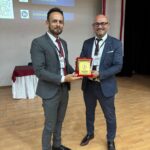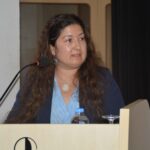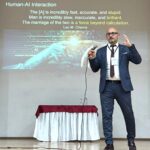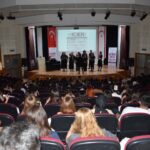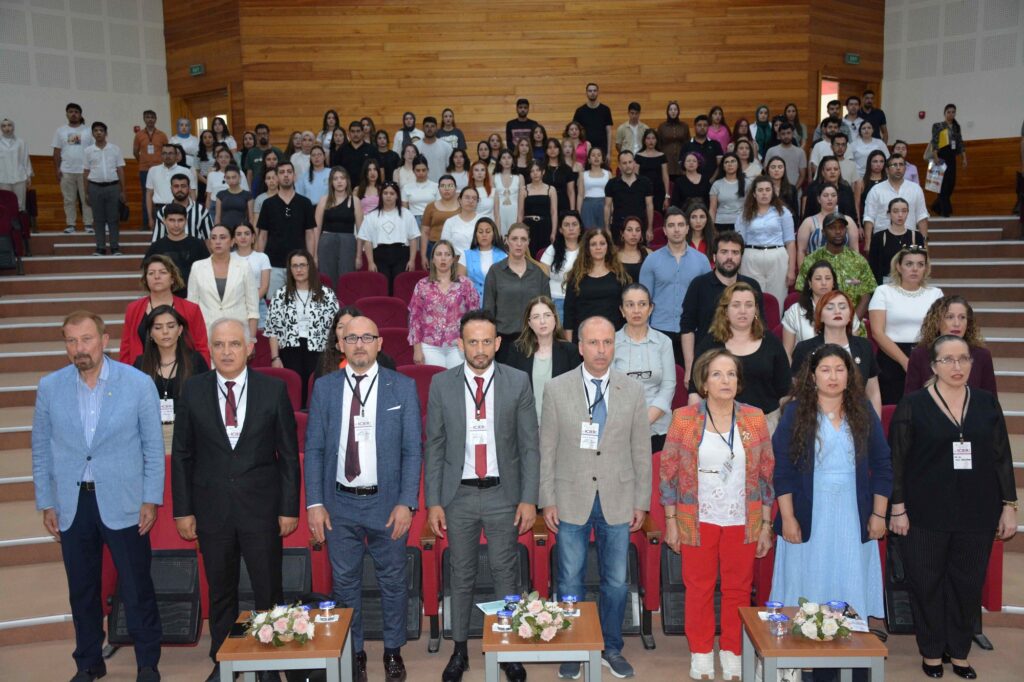
The ICIER 2025 conference, held for the seventh time this year in collaboration with the Near East University Atatürk Faculty of Education and the Institute of Graduate Education and Research, was carried out with interdisciplinary approaches in the field of educational sciences under the theme of “Social Sustainability in Education” in line with sustainable development goals.
The “International Conference on Interdisciplinary Educational Reflections (ICIER 2025), organized for the seventh time this year in collaboration with the Near East University Atatürk Faculty of Education and the Institute of Graduate Education and Research, brought together expert participants in the field on the Near East University campus.
Drawing attention with its content that is renewed every year, ICIER offered participants a productive and inspiring experience with its structure that integrates theory and practice this year as well. Aiming to contribute to the educational understanding of the age by focusing on the interdisciplinary perspective, the conference provided participants with the knowledge and skills that will contribute to their academic and professional development. The conference, which had international participation, consisted of 130 participants and over 70 papers were presented. Along with the workshops organized, training was provided to a group of 80 people consisting of academicians, graduate students and teachers.
The opening speech of the conference, which started with a moment of silence and the National Anthem, was made by Prof. Dr. Umut Akçıl, Dean of the Atatürk Faculty of Education of the Near East University, and Prof. Dr. Fahriye Altınay Aksal, Head of the Department of Computer and Educational Technologies Education at the Atatürk Faculty of Education. In addition, Prof. Dr. Aras Bozkurt, Member of the TBMM Artificial Intelligence Commission and Dean of the Anadolu University Open Education Faculty, and Prof. Dr. Yunus Eryaman, Former President of the World Education Research Association (WERA), were speakers at the opening of the conference.
Skills were reinforced with applied training…
In addition to the papers presented within the scope of the conference, the workshops organized offered the participants the opportunity to develop their application skills in education. In the workshops held at the NEU Education Palace of the Atatürk Faculty of Education, prospective teachers had the opportunity to support their professional development with one-on-one applications. The sessions, which were conducted with limited quota, attracted great attention, and certificates were presented to the participants at the end of the event.
They practiced with expert trainers!
The workshops were carried out with the contributions of experts in their fields. Ayşem Tomgüsehan, President of the Interactive Drama Association, presented an interactive experience aimed at developing the communication skills of prospective teachers with her workshop titled “21st Century Life Skills: Sustainable Effective Communication”. Assoc. Prof. Dr. Şengül Başarı, Member of the Turkish Cypriot Psychological Counseling and Guidance Association and Near East University Faculty Member, shared bibliotherapy methods that aim to contribute to emotional and cognitive development through books in her workshop titled “Bibliotherapy Applications for Quality Education”. Prof. Dr. Murat Tezer, Member of the Near East University Faculty Member, provided information on how statistical analyses can be used effectively in educational research in his workshop titled “Statistical Applications in Education”. In the workshop titled “Qualitative Data Analysis Applications: QDA Miner”, Dr. İslam Suiçmez explained how to use the computer program called QDA Miner, which is used in qualitative data analysis and helps to analyze and interpret texts, in a practical way.
The requirements of the age and technological developments should be followed closely!
Stating that radical changes are needed in the education system for social sustainability, Prof. Dr. Umut Akçıl, Dean of the Atatürk Faculty of Education of Near East University, said, “While ensuring this change, we need to follow the requirements of the age and technological developments closely.” Emphasizing that Near East University has a pioneering place in the usability of artificial intelligence technologies in education, Prof. Dr. Umut Akçıl said, “Our university has implemented the ‘Prof. Dux’ project and then established the Faculty of Artificial Intelligence and Informatics, breaking a new ground. At the heart of these goals lies the idea of ‘experiencing the future from today’. These developments, which open new horizons for our students, will also build the society of the future.”
Technology should be integrated into every field!
Stating that universities have an important place in providing service to society, Atatürk Faculty of Education Computer and Educational Technologies Education Department Head Prof. Dr. Fahriye Altınay Aksal said; “We aim for our graduates to be individuals who are innovative, entrepreneurial and equipped with contemporary research skills, as well as committed to ethical principles.” Prof. Dr. Fahriye Altınay Aksal said, “Integrating technology into every field is of great importance in this respect. In this context, this conference is very precious in terms of showing solidarity and interdisciplinary perspectives.”
Human-centered processes in artificial intelligence were emphasized!
Speaking at the event, Prof. Dr. Aras Bozkurt, Member of the TBMM Artificial Intelligence Commission and Dean of Anadolu University Open Education Faculty, focused on what productive artificial intelligence is, how to use it and what to pay attention to. Prof. Dr. Bozkurt emphasized that using technologies alone is not sufficient, and that processes that prioritize human supervision and center on humans should be developed.
Former President of the World Educational Research Association (WERA), Prof. Dr. Yunus Eryaman, drew attention to the international dimension of evidence-based education policies in his presentation titled “Artificial Intelligence and Big Data-Based School Evaluation and Excellence in Education.” Prof. Dr. Eryaman emphasized the roles undertaken by the World and European Educational Research Associations at global and local levels within the scope of approaches developed for excellence in education.
